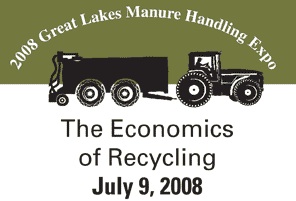
 July 2, 2008, London, OH – The
July 2, 2008, London, OH – The
routine of agricultural production can become perilous when attention
to safety takes a back seat to the ease and efficiency of operating
farm machinery.
July 2, 2008, London, OH – The routine of agricultural production can become perilous when attention to safety takes a back seat to the ease and efficiency of operating farm machinery.
 A team of safety specialists from Ohio State University Extension will demonstrate the hazards of operating farm equipment at the Great Lakes Manure Handling Expo on July 9 at the Molly Caren Agricultural Center in London, Ohio. Whether a farmer is driving a tractor or spreading manure on the farm, the message is the same: Safety comes first.
A team of safety specialists from Ohio State University Extension will demonstrate the hazards of operating farm equipment at the Great Lakes Manure Handling Expo on July 9 at the Molly Caren Agricultural Center in London, Ohio. Whether a farmer is driving a tractor or spreading manure on the farm, the message is the same: Safety comes first.
“When you are working with mechanized equipment, you have to respect it for the hazards that are potentially present,” said Dee Jepsen, who also holds an appointment with the Ohio Agricultural Research and Development Center. “Maintenance is important to keeping equipment working properly and to avoid running into injuries associated with faulty equipment or broken parts.”
Although each piece of equipment is unique and designed with a specific purpose, all farm machinery shares one commonality – risk points. Risk points are specific places on equipment where the risk of injury is the greatest, such as gears, chains, cutting edges and revolving shafts.
Jepsen said there are eight specific hazard points of peril associated with farm equipment: cut points, rap points, pinching, crushing, burning, thrown objects, free-wheeling parts, and stored energy hazards, such as those associated with compressed springs.
“Farmers should become familiar with those risk points on all farm machinery, especially the equipment they use routinely,” said Jepsen. “The important aspect of equipment safety starts with maintenance. And once equipment has been serviced, all guards should be replaced so there is limited potential for coming into contact with the various hazard points.”
Farm equipment contributes to 75 percent of all agricultural injuries in Ohio, according to statistics reported by Ohio State’s Agricultural Safety and Health Program.
In addition to farm equipment safety, Jepsen will also discuss ways to stay safe when working with manure in storage.
“It’s important to remind workers of the gases associated with manure in storage facilities, and the respiratory hazards involved when farmers are in that environment and there is no adequate ventilation,” said Jepsen. “Someone can be overcome very easily in that situation.”
Jepsen will share how manure gases affect the body and what types of respiration to wear when handling manure in confined spaces. She will also demonstrate the type of air monitoring devices available for gas detection.
OSU Extension safety specialists Wayne Dellinger and Tim Butcher will also participate in the safety demonstrations during the event.
The theme of the Great Lakes Manure Handling Expo is “The Economics of Recycling” and will include commercial field demonstrations, educational demonstrations, educational sessions, and commercial vendor displays. The event will run from 8:30 a.m. until 4 p.m.
The event is sponsored by Ohio State University Extension, the Ohio Agricultural Research and Development Center, Michigan State University, Purdue University, Penn State University and Cornell University . Additional sponsors include Ohio Composting and Manure Management and the Midwest Professional Nutrient Applicators Association.
To learn more, log on to http://ohio-environmental.org, http://oema.osu.edu, or contact Jon Rausch at (614) 292-4504 or rausch.7@osu.edu, or Mary Wicks at (330) 202-3533 or wicks.14@osu.edu.